
Quiznos Franchise Horror Story: Detecting a 95% Collapse
In the mid-2000s, thousands of entrepreneurs were Quiznos franchisees, participating in a toasted sub chain that was rapidly expanding, challenging the biggest names in the industry, including Subway.
At its peak in 2007, the Quiznos system boasted 4,700 locations and almost $2 billion in sales.
But by 2025, fewer than 200 United States locations remained. A staggering 95% of the system had vanished, taking some franchisees' valuable investments along the way.
Let's turn back to late 2012, five years into the epic slide (Quiznos still had 2,353 units at the end of 2011):
- The economy was recovering from the Great Recession.
- Quiznos was under new ownership post-restructuring.
- A revamped "Better Than Ever" menu had launched.
- And a fresh "Qrave Quiznos" marketing campaign was the hopeful sign of a brand comeback.
While receiving a rosy sales pitch from Quiznos corporate about the franchise's turnaround, did prospective franchisees have any way to see the warning signs of the continued Quiznos collapse?
To answer this, we ran the 2012 Quiznos Franchise Disclosure Document (FDD) Package — all 493 pdf pages of the Quiznos FDD, Franchise Agreement, and Exhibits — through our AI-powered FDD Risk Review.
The full review — an example of the comprehensive analysis our AI delivers to our customers — is here.
The results: the FDD Package held a blueprint of the continued disaster.
The Squeeze on Franchisees
A most critical flaw our AI analysis uncovered was not just one bad contract clause, but a fundamental conflict at the heart of the Quiznos business model. The franchisor's financial success was structurally dependent on its franchisees' high operating costs and fees.
Our report flagged several High Severity risks that revealed this squeeze:
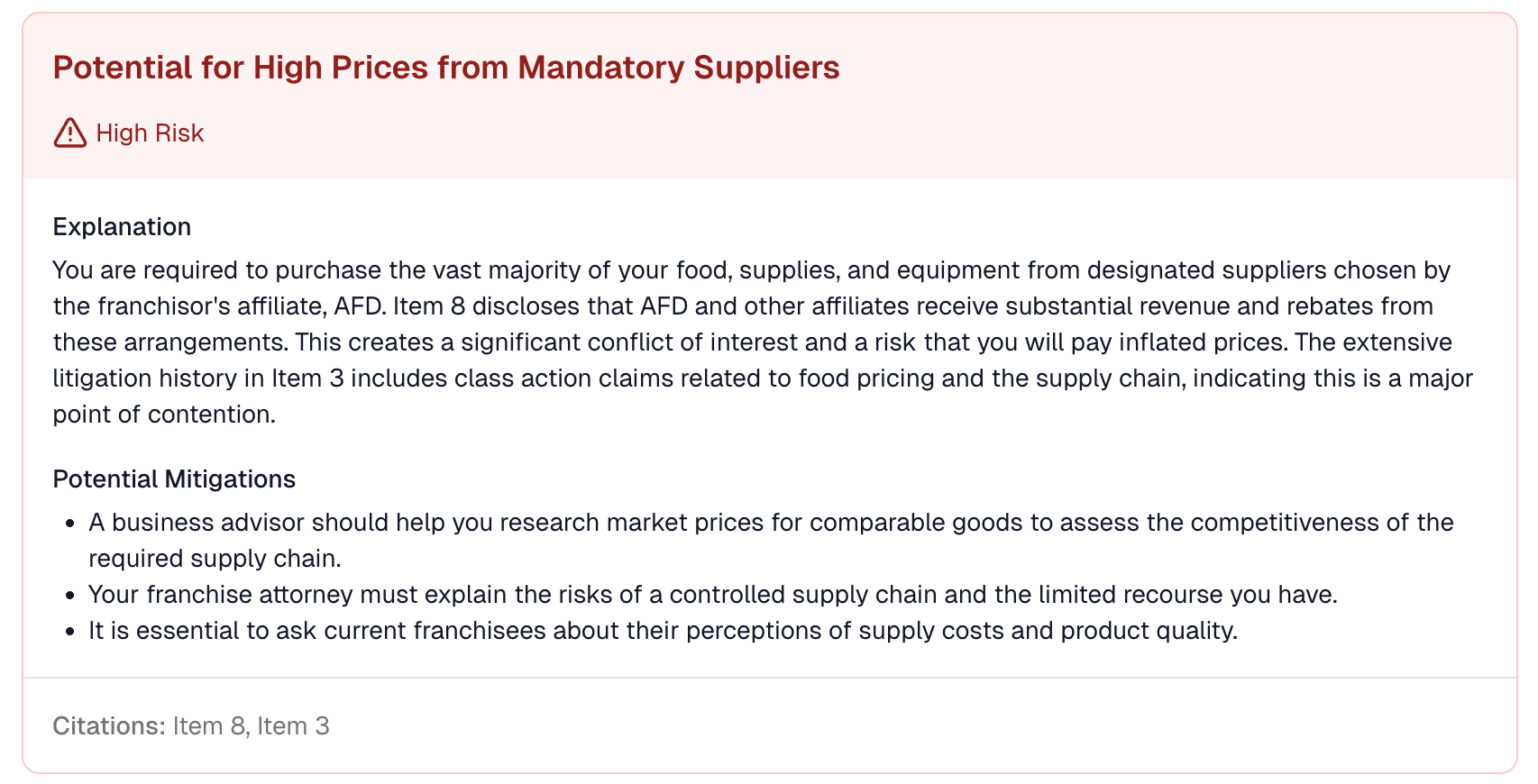
Explanation: You are required to purchase the vast majority of your food, supplies, and equipment from designated suppliers chosen by the franchisor's affiliate, AFD. Item 8 discloses that AFD and other affiliates receive substantial revenue and rebates from these arrangements. This creates a significant conflict of interest and a risk that you will pay inflated prices. The extensive litigation history in Item 3 includes class action claims related to food pricing and the supply chain, indicating this is a major point of contention.
Potential Mitigations: A business advisor should help you research market prices for comparable goods to assess the competitiveness of the required supply chain. Your franchise attorney must explain the risks of a controlled supply chain and the limited recourse you have. It is essential to ask current franchisees about their perceptions of supply costs and product quality.
This was the root of the Quiznos disaster. Franchisees' profit margins were squeezed by the franchisor's mandated low prices for customers, and its mandated high prices for supplies. The extensive litigation history in Item 3, including class-action claims about this very issue, confirmed this was a major point of contention.
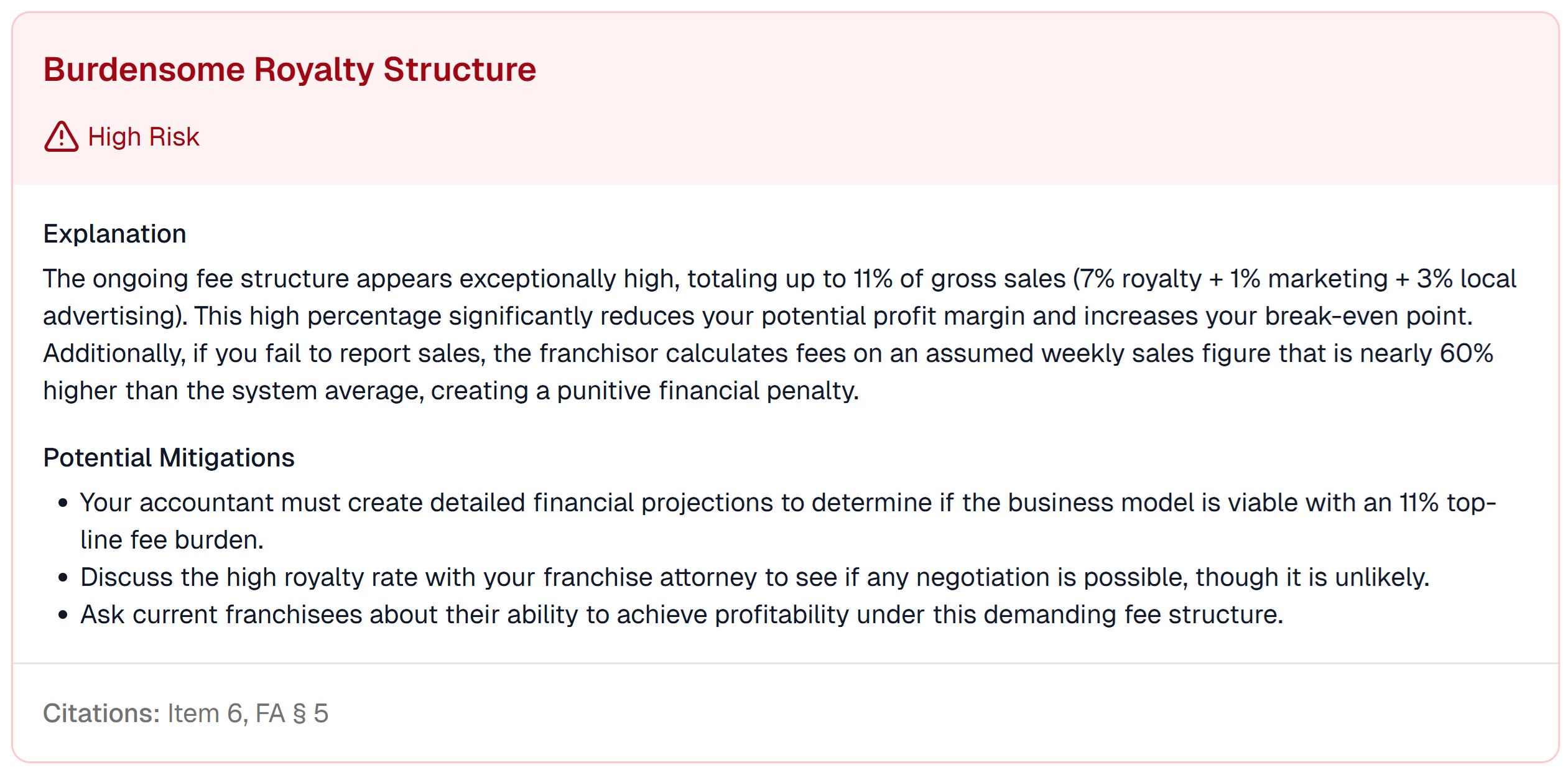
Explanation: The ongoing fee structure appears exceptionally high, totaling up to 11% of gross sales (7% royalty + 1% marketing + 3% local advertising). This high percentage significantly reduces your potential profit margin and increases your break-even point. Additionally, if you fail to report sales, the franchisor calculates fees on an assumed weekly sales figure that is nearly 60% higher than the system average, creating a punitive financial penalty.
Potential Mitigations: Your accountant must create detailed financial projections to determine if the business model is viable with an 11% top-line fee burden. Discuss the high royalty rate with your franchise attorney to see if any negotiation is possible, though it is unlikely. Ask current franchisees about their ability to achieve profitability under this demanding fee structure.
And there was more.
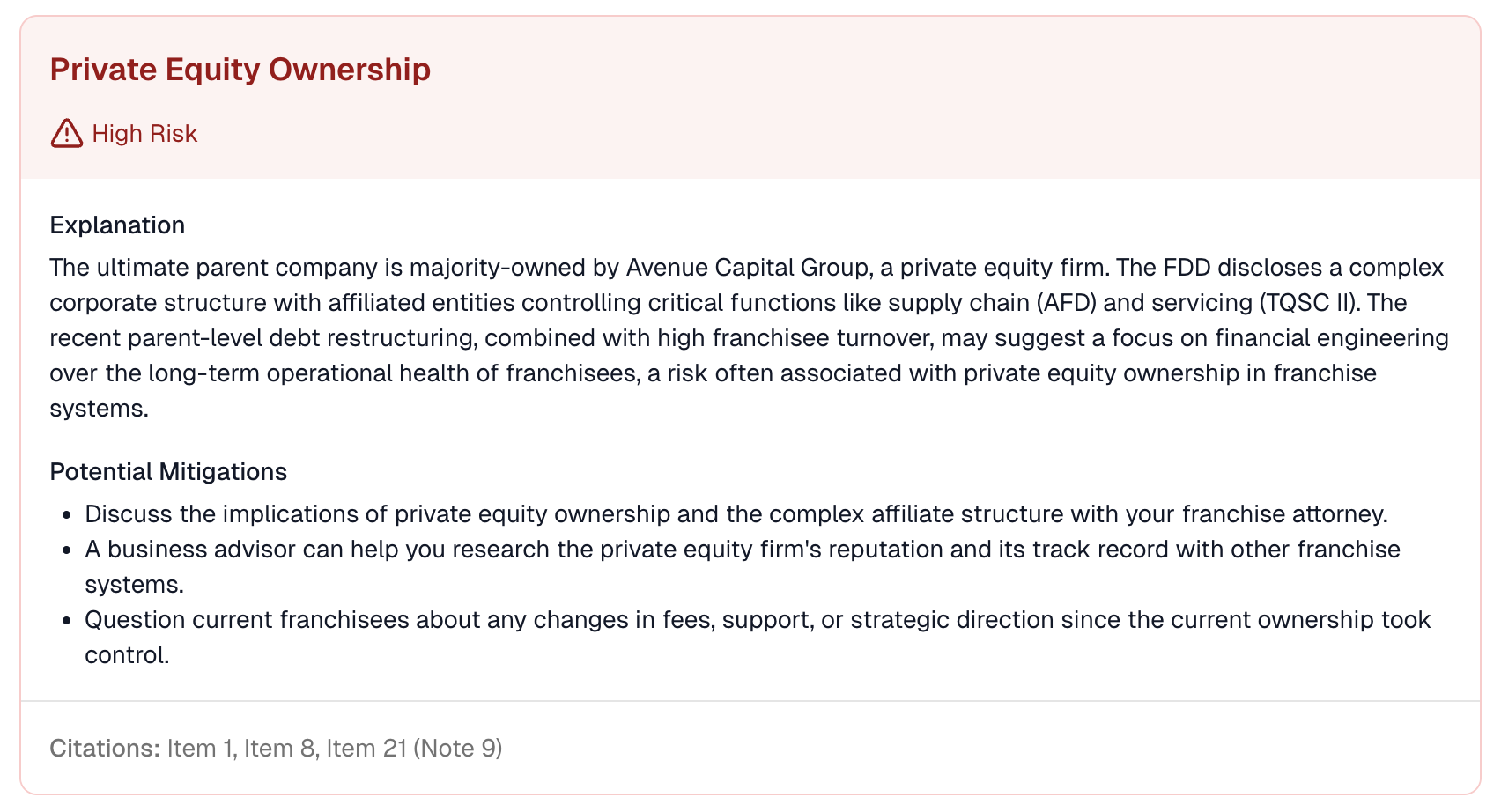
Explanation: The ultimate parent company is majority-owned by Avenue Capital Group, a private equity firm. The FDD discloses a complex corporate structure with affiliated entities controlling critical functions like supply chain (AFD) and servicing (TQSC II). The recent parent-level debt restructuring, combined with high franchisee turnover, may suggest a focus on financial engineering over the long-term operational health of franchisees, a risk often associated with private equity ownership in franchise systems.
Potential Mitigations: Discuss the implications of private equity ownership and the complex affiliate structure with your franchise attorney. A business advisor can help you research the private equity firm's reputation and its track record with other franchise systems. Question current franchisees about any changes in fees, support, or strategic direction since the current ownership took control.
In other words, the franchisor's need to service its own massive debt made the revenue from the controlled supply chain and high fees too vital to relinquish, even as these costs crushed operators. Importantly, our AI suggested that a prospective franchisee consult with a business advisor, an accountant, a franchise attorney, and current Quiznos franchisees to address these severe risks.
A System in Freefall
Our AI flagged these additional risks for the 2012 version of Quiznos, presenting a grim picture of system-wide instability in the midst of the final collapse.
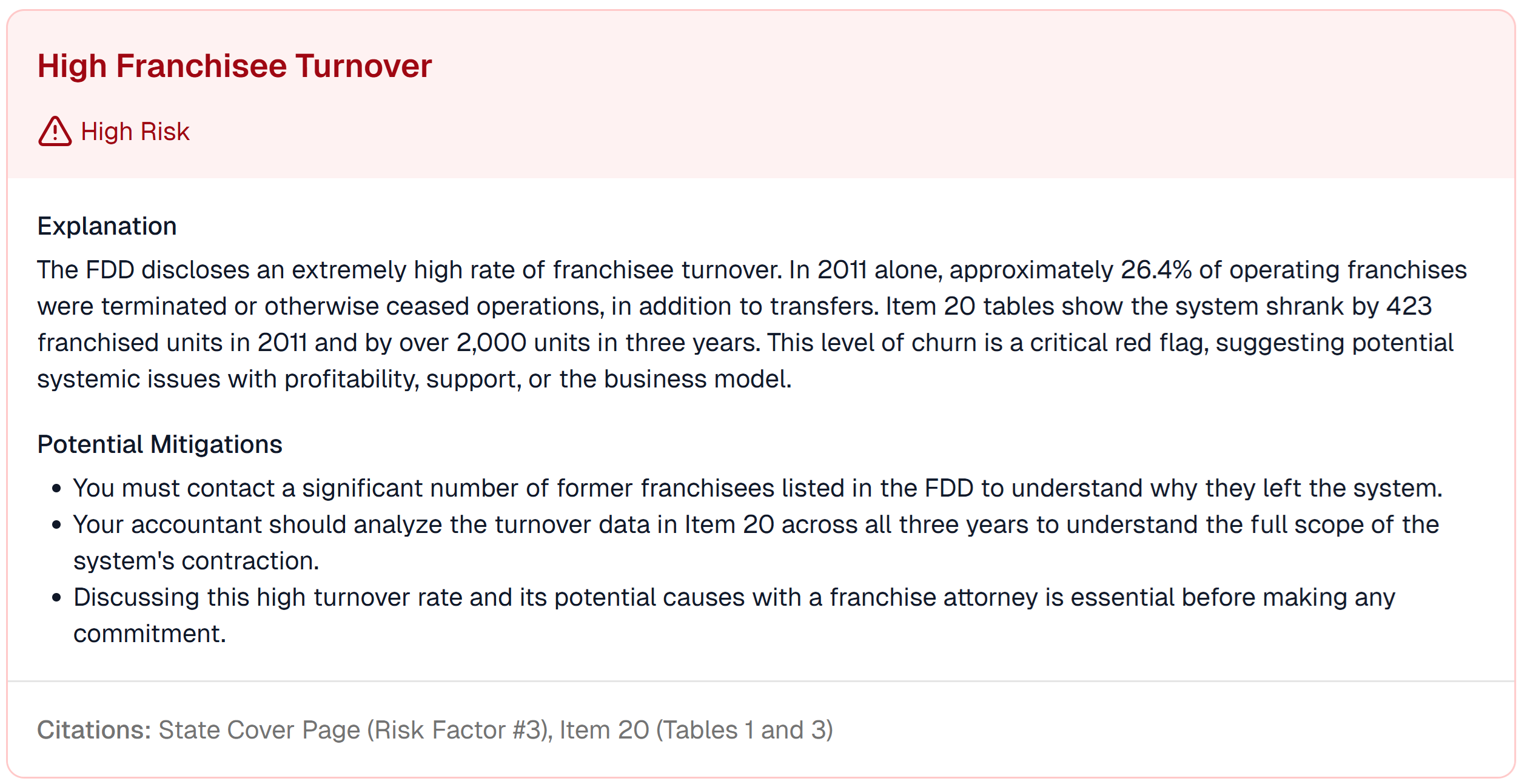
Explanation: The FDD discloses an extremely high rate of franchisee turnover. In 2011 alone, approximately 26.4% of operating franchises were terminated or otherwise ceased operations, in addition to transfers. Item 20 tables show the system shrank by 423 franchised units in 2011 and by over 2,000 units in three years. This level of churn is a critical red flag, suggesting potential systemic issues with profitability, support, or the business model.
Potential Mitigations: You must contact a significant number of former franchisees listed in the FDD to understand why they left the system. Your accountant should analyze the turnover data in Item 20 across all three years to understand the full scope of the system's contraction. Discussing this high turnover rate and its potential causes with a franchise attorney is essential before making any commitment.
This turnover was a critical red flag suggesting systemic issues that new ownership, menu, and marketing plan might not alleviate. Also, the Financial Performance Representation (FPR) in FDD Item 19 looked appealing at first glance, but our AI flagged multiple high-severity flaws:
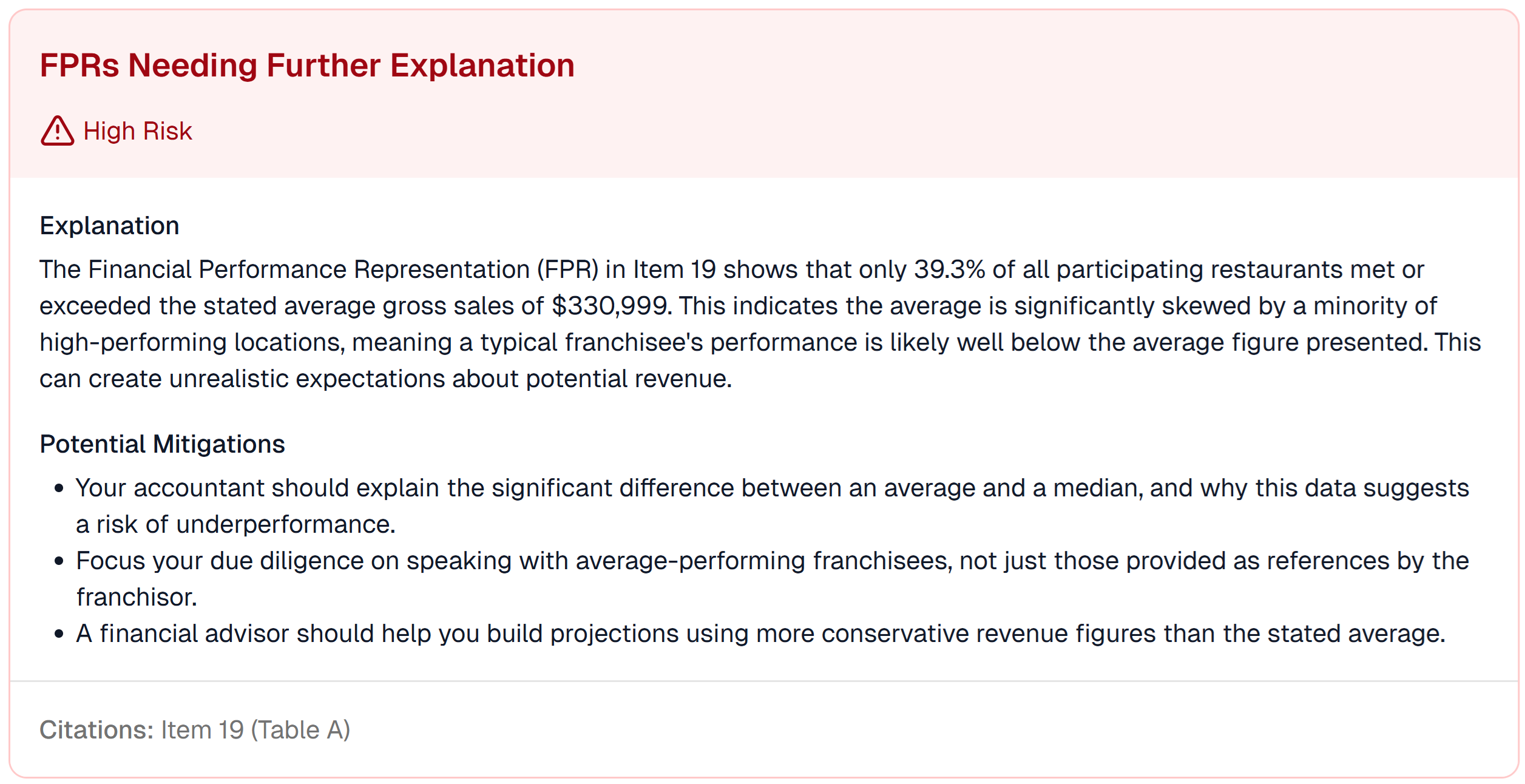
Explanation: The Financial Performance Representation (FPR) in Item 19 shows that only 39.3% of all participating restaurants met or exceeded the stated average gross sales of $330,999. This indicates the average is significantly skewed by a minority of high-performing locations, meaning a typical franchisee's performance is likely well below the average figure presented. This can create unrealistic expectations about potential revenue.
Potential Mitigations: Your accountant should explain the significant difference between an average and a median, and why this data suggests a risk of underperformance. Focus your due diligence on speaking with average-performing franchisees, not just those provided as references by the franchisor. A financial advisor should help you build projections using more conservative revenue figures than the stated average.
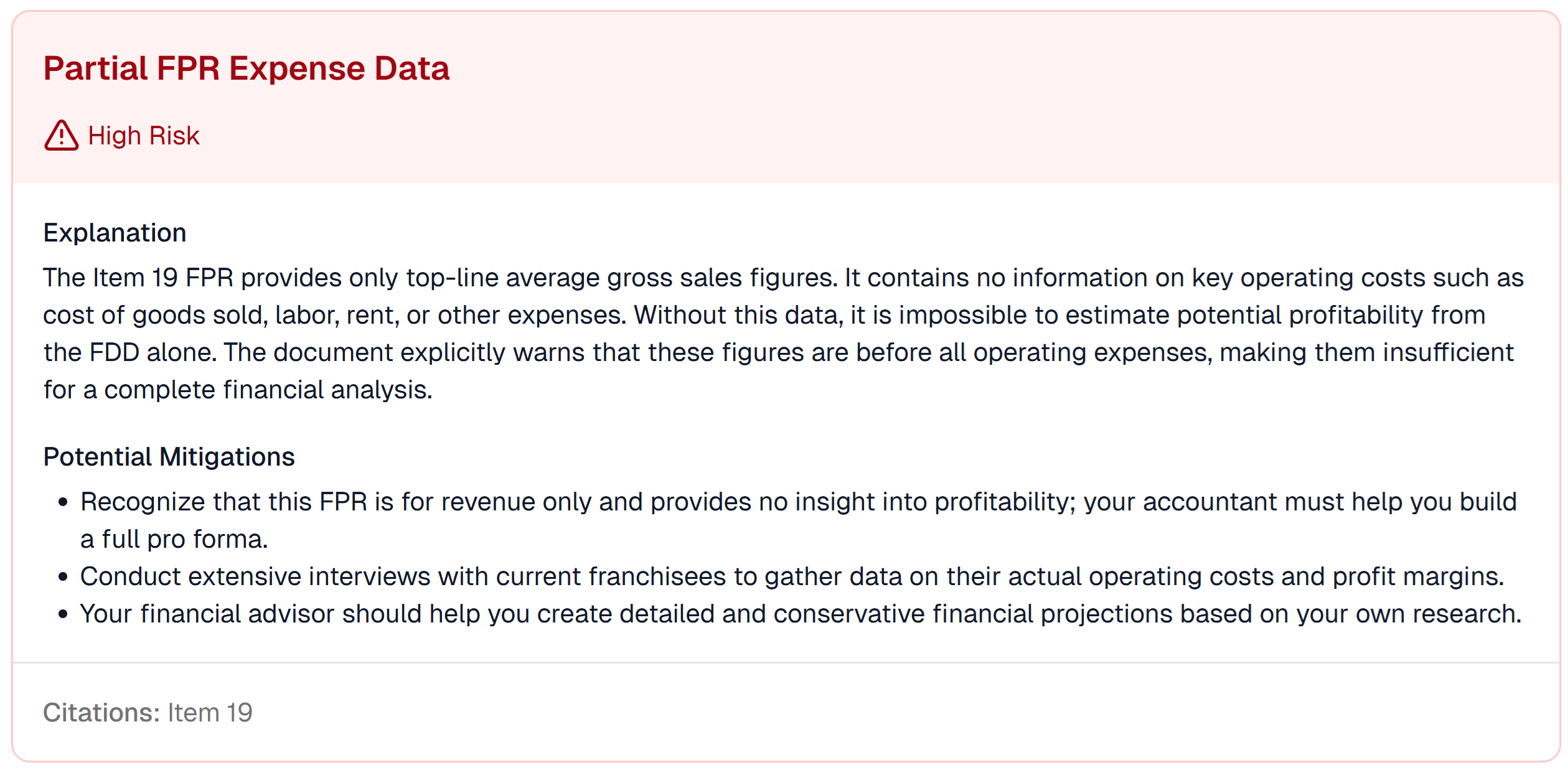
Explanation: The Item 19 FPR provides only top-line average gross sales figures. It contains no information on key operating costs such as cost of goods sold, labor, rent, or other expenses. Without this data, it is impossible to estimate potential profitability from the FDD alone. The document explicitly warns that these figures are before all operating expenses, making them insufficient for a complete financial analysis.
Potential Mitigations: Recognize that this FPR is for revenue only and provides no insight into profitability; your accountant must help you build a full pro forma. Conduct extensive interviews with current franchisees to gather data on their actual operating costs and profit margins. Your financial advisor should help you create detailed and conservative financial projections based on your own research.
The One-Sided Deal
Beyond the challenging elements of the 2012 Quiznos business model, our AI's analysis of the Franchise Agreement found terms that shifted nearly all risk onto the franchisee.
This revealed a power imbalance even beyond what is typical in franchising, including these High Severity risks in the contract terms:
-
Franchisee's Unlimited Personal Guaranty: The FDD required all owners (and potentially their spouses) to sign a personal guaranty, making them personally liable for all business debts. This meant their personal assets, like their homes and savings, were at risk.
-
Liability for Future Royalties: If your franchise was terminated, you could be liable for a lump-sum payment for all future royalties for the remainder of your 15-year term. The FDD even disclosed this could apply if you never opened the restaurant—a potentially ruinous penalty on a failed business.
-
No Exclusive Territory: The franchisor reserved the right to open another Quiznos anywhere, at any time, including directly next door to a franchisee's location, creating a risk of complete market cannibalization.
Avoiding Your Own Horror Story
The dramatic collapse of Quiznos impacted thousands of American small business owners.
The deepest horror is that the warning signs were not hidden, they were disclosed right in the Quiznos FDD Package—all 493 pages of it—buried within dense legalese and complex data.
An objective, data-driven analysis could have highlighted these risks for prospective Quiznos franchisees in 2012, before they had invested a single dollar in the failing system.
An FDD Risk Report is not a substitute for professional advice. Rather, it is an indispensable tool to prepare you for those critical conversations.
By identifying and explaining the specific risks buried in an FDD, our AI service empowers you to ask the right questions and become a better-informed client for your franchise advisors.
Before you sign what could be the most important long-term contract of your life, get an FDD Risk Report to optimize your advice from your trusted franchise professionals.